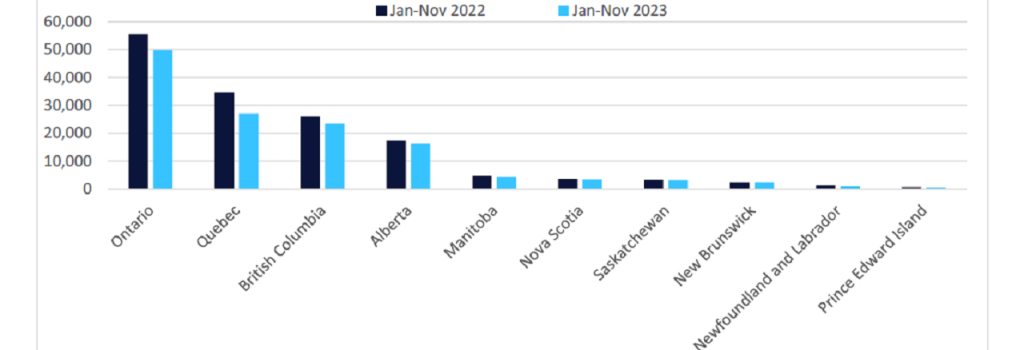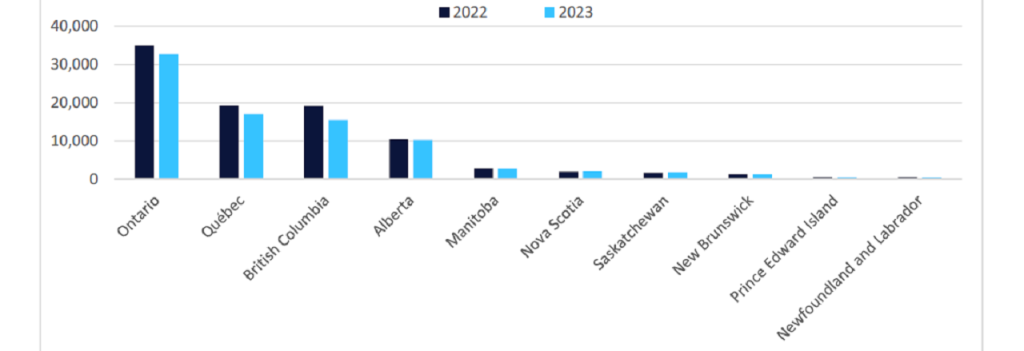The construction industry in Canada is estimated to have shrunk by 1.7% in real terms in 2023, owing to a weak economic outlook, falling building permits, high building construction prices, and continued weakness in the residential sector amid a tightening of monetary policy.
Reflecting the continued weakness in building investments, particularly in residential
buildings, total construction investments in Canada fell by 12.3% year-on-year (YoY) in the first 11 months of 2023. The residential sector was most impacted - declining sharply by 18% YoY.
While non-residential sector growth was flat at 0.8%, within the residential sector, investment in single-dwelling construction fell by 23.3% YoY and multiple-dwelling building investments fell by 12%.
Of the country's 13 provinces (including three territories), Ontario accounted for the highest share of building investments registered during the first 11 months of 2023 - equivalent to 37.8%.
Quebec ranked second, accounting for one-fifth (20.5%) of building
investments, followed by British Columbia (17.8%) and Alberta (12.3%).
Ten of the 13 provinces registered YoY declines in terms of building investments during the first 11 months of 2023.
The sharpest decline was seen in Nunavut (-48.8%) while Newfoundland and Labrador (-34.5%), Quebec (-21.9%), and Prince Edward Island (-14.6%) were other notable provinces with high rates of declining building investments.

The country's construction industry is expected to shrink further by 3.1% in 2024, owing to rising construction prices across all subsectors, skilled labour shortages, and higher interest and mortgage rates.
According to Statistics Canada, the average residential building construction price index increased by 7.6% YoY in 2023 while the average non-residential building construction price index increased by 7.1%.
Building permits in total construction remain highly volatile on a monthly basis, reflecting the subdued investor confidence that has persisted since 2022.
According to Statistics Canada, the total value of building permits
issued declined by 8.9% YoY in 2023, following a 6.9% annual decline in 2022, indicating a significant drop in investor confidence.
Residential construction permits fell 15.5% YoY in 2023 while non-residential construction permits rose only 1.7%.
Also, in terms of segmentation, residential construction was weakened by permit declines of 24.1% YoY in single dwellings and 8.8% YoY in multiple-dwelling buildings.

By province, 38.8% of the total building permits issued in 2023 were for Ontario, followed by 20.3% in Quebec, and 18.4% in British Colombia. Only three of the 13 provinces reported an increase in total building permits issued.
The remaining ten provinces reported sharp declines due to rising construction prices, labour shortages, and the inability of small-to-large contractors to obtain loan rates, thereby resulting in a massive gap in the supply side, particularly in residential construction.
Nunavut registered the largest YoY decline of 97.5% in 2023, followed by 20.1% in Newfoundland and Labrador province, and 19.1% YoY in British Columbia.

Major constraints in 2024 also arise from the central bank of Canada's multiple interest rate increases since 2022.
It progressively raised its policy rate from 0.25% in March 2022 to 5% in July 2023 to cool an overheated economy and kerb rising inflation.
However, in response to the rate increase, the Canadian Federation of Independent Business (CFIB) estimates that the construction industry lost more than C$12.3bn ($9.6bn) in revenue opportunities in 2022.
More than half (52%) of construction businesses witnessed declining sales or contracts, 38% postponed the timing of existing contracts, and only 10% remained at normal work.
The CFIB also expects more losses in 2024, with the industry only beginning to recover in the second half of 2023.














